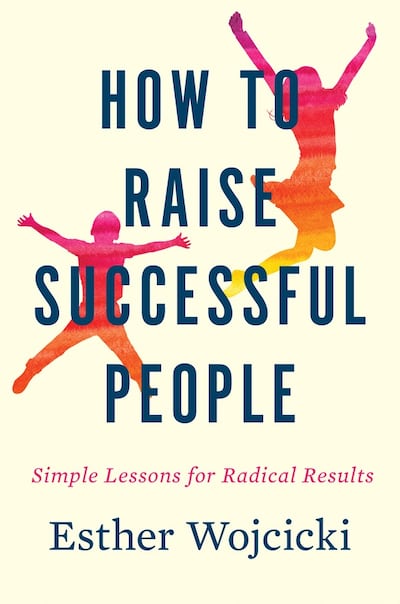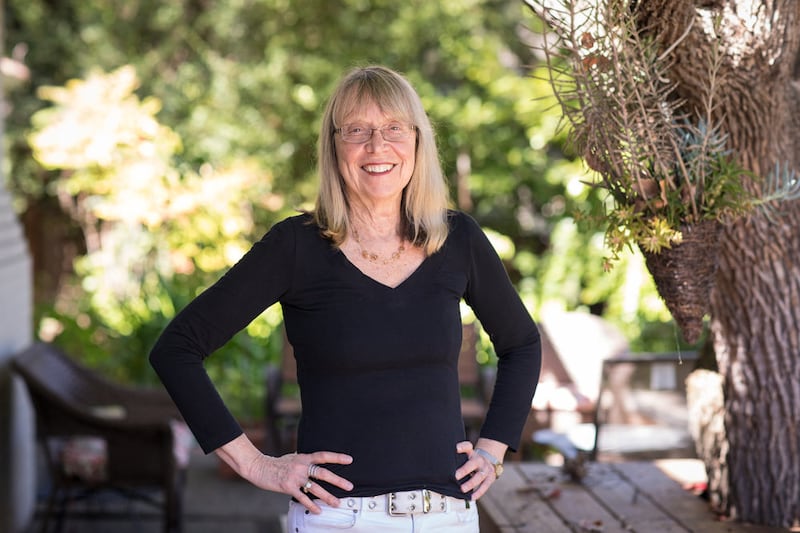SALT LAKE CITY — If the measurement of a mother is how successful her children are as adults, Esther Wojcicki gets an A. She raised an epidemiologist out to end childhood obesity, plus the CEOs of 23andMe and YouTube.
Successful in her own right, Wojcicki, 78, has been married to a Stanford physicist for 58 years and is a journalist who built a legendary media arts program at Palo Alto High School, where she's known as the 'Godmother of Silicon Valley.'
But in her new book, “How to Raise Successful People,” Wojcicki reveals that when she first became a parent, she knew so little about what to do that she begged the hospital staff to let her stay an extra day, and that her own upbringing gave her no role models to consult as she raised her daughters.
In fact, her husband, Stanley, was away so much for work that Wojcicki largely forged the path on her own, with the help of a popular child-rearing book and an encouraging pediatrician.
In an interview with the Deseret News, Wojcicki, who lives in Palo Alto, California, talked about the five principles of child-rearing that she promises will deliver “radical results” for every family, what she wishes she'd done differently, and why she decided to include painful details about her own childhood in the book.
This interview has been edited for clarity and length.
Deseret News: In “How to Raise Successful People,” you write frankly about growing up with a father who made clear that he valued boys over girls, the death of a young brother, and other challenges that made you want to leave your home as soon as you could. How difficult was it for you to make these stories public?
Esther Wojcicki: I probably wouldn’t have done it if my parents were still alive.
The reason I did it is because I wanted people to understand that you have to really think consciously about your parenting, and you can’t just go on instinct, especially if you don’t want to repeat the way that you were brought up. A lot of people come from childhoods that are not as pleasant as they wish they had been, and you have to put parenting on a conscious level so you don’t make the same mistakes. It was painful to write about it, but I’ve come to peace with it. I accept it, and I’m not mad about it. I just want to make it better for other kids.

DN: It appears that you have forgiven your parents, and your father in particular. How were you able to do that?
EW: I realized as I got older and more experienced that my father was just a product of his generation. He was dealing with a lot of his own demons, and also problems that he faced when he was a child. He did his best, although I think he could have done a better job controlling his temper. … When people are living with anger, the person who suffers the most is the person who carries the anger. No matter what your path is, to reach that conclusion is the smart way to live; otherwise you’re just mad all the time.
DN: Some critical reviews of your book said you and your husband lived in a bubble of privilege in the Stanford community; you lived in the same house for more than 50 years, in an area known for being intellectually robust. Do you think the principles you lay out in your book using the acronym TRICK (trust, respect, independence, collaboration and kindness) can work no matter where people live?
EW: It works everywhere and with everybody. I've been criticized for having too simple of a solution. But simplicity is the gift; it is simple. Everyone wants trust and respect. It took me 35 years to come up with this acronym; it wasn't overnight. And we struggled.
We moved into this house — it's a big house, about 3,300 square feet, which felt enormous — and we had no furniture for years. The kids rode their bikes in the living room because there was nothing in the living room. We were not rich. We just accidentally, honestly, with the advent of Google and the fact that my daughters became connected to this incredible company, got rich. I could have moved to another house. But I've stayed in the same house. I'm still driving the same car (a 2006 Lexus). I don't see any reason to change. It still works great. Why would I want to get rid of it?
DN: It seems that loyalty is another one of your values, and you have spoken out against divorce, saying that people shouldn't do it except in the case of abuse, untreatable addiction or violence. Is this because of your experience with children going through divorce at your school?
EW: It’s terrible for the people going through a divorce; it’s particularly terrible for the kids. I see the repercussions in school. Kids will change from one week to the next when they’re told their parents are getting a divorce; it’s like a death in the family. Their performance goes down; they don’t care about things. Parents have this narcissistic attitude (saying) the kids will be fine, they’ll figure it out. That is so self-serving. Those kids rely on you. You are their world. It results in a lot of unhappy children, a lot of unhappy adults.
You just have to work it out. I think loyalty and stability and sticking with your promises is important. We’ve seen lots of ups and downs, but for the most part it’s up. If it’s (up) 51 percent of the time, you’ve done a good job.
DN: You have said that the late Dr. Benjamin Spock helped you learn to be a parent through his iconic book. Who else has influenced and inspired you?
EW: I read this book, called “The Blessing of a Skinned Knee” (by Wendy Mogel) that was very good. I didn’t read it when my children were small, but it follows a lot of the same philosophy that I have.
Dr. Spock was really my bible, but the other person who played a big role was my pediatrician.
His name was Dr. (Marts) Beekley at the Kaiser Foundation in Redwood City, California. What I was impressed with was that it was a group of doctors, but they all worked as a team. Everyone knew you, and everyone knew your kids. They wanted to empower me as a parent; they didn’t want me to just follow instructions blindly. I give them a lot of credit for helping me to be a good parent because I wasn’t rushing into the doctor all the time. Doctors need to realize how important they are in the lives of young mother and fathers. They’re like part of your family.
DN: Were you home full time with your daughters while they were young?
EW: I was home with them for about 10 years, and then I started substituting (as a teacher) for a few years in the Palo Alto school district. I was hired in 1984. Back in the early '70s, women basically didn’t work unless they 'had' to work. I wanted to work and go back to teaching, but it was hard to find babysitters. The culture was very different back then. I stayed home until my kids were in school and they could handle me going to work.
DN: When she was 4, your daughter Susan (now CEO of YouTube) was one of the participants in the famous “marshmallow study” at Stanford University that examined self-control in children, and she apparently was among the children with the most self-control. What advice do you have for parents in teaching self-control, both as a means of combating the obesity epidemic, and being able to delay gratification to help with other things in life?
EW: There are a lot of things you can do to teach self-control. With little kids, for example, you can give them a candy, a gummy bear, in a plastic bag and say 'I want you to save that for a certain time, and then you can have it.' What you’re doing is instilling a habit of waiting, (teaching them), that you have some control over what you’re doing and eating.
Also, you can teach them self-control in habits like cleaning up after yourself. Close the door, close the cabinet, put your towel back on the rack. You teach self-control through all these little things, and also through saving money. You can say,OK, I’m going to give you 25 cents today and 25 cents tomorrow and 25 cents the next day. You teach them to control themselves and to save up for something that matters to them.
Also, a lot of parents see food as a reward. That sets you up for a lifetime of problems, because whenever you’re feeling bad about yourself, you reward yourself with food. Food should not be a reward.
DN: Were you raised in a faith tradition, and did you raise your daughters with religious faith?
EW: I was raised as a Jew, orthodox Judaism, and then I married a Catholic. So we blended both religions; the teachings are very similar. Two of them had a bat mitzvah. I gave them a choice; they got to pick whatever they wanted to do, they got to pick what they wanted to be. I felt that both of those religions offered a lot of the same spirituality, so I said you pick whatever you want to do. They picked at age 12. That follows my philosophy that it's their life, and it's my responsibility as a parent just to nurture them, to make sure they get what they need, and support them in their choices.
DN: With the benefit of hindsight, is there anything you would have done differently in your parenting?
EW: I think I would have emphasized gratitude more. I did emphasize it, but I might not have emphasized it enough. We’re a society of consume, consume, consume, and I think we’ve all had enough.
My kids have shared a lot; they are very good about that, but I wonder whether or not we could have done even more, helped even more people. You feel happier and better when you help others. There is nothing more satisfying than helping other people.
You know we're a nation now where we aren’t very religious anymore, but I think one of the positive aspects of religion — and that’s all religions — (is that) they all teach gratitude, and that has sort of gone out the window with the fact that we are not churchgoing anymore.



